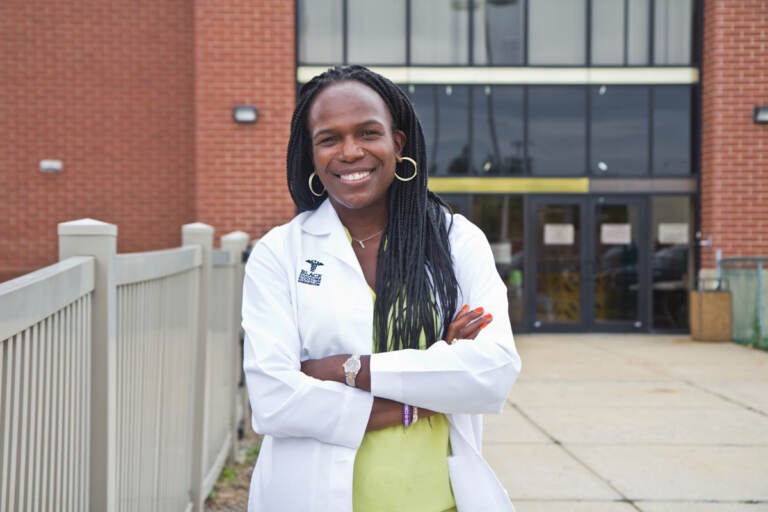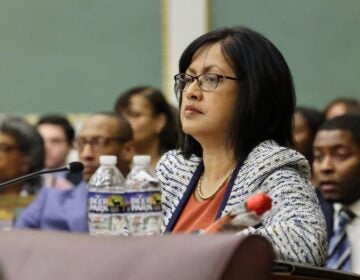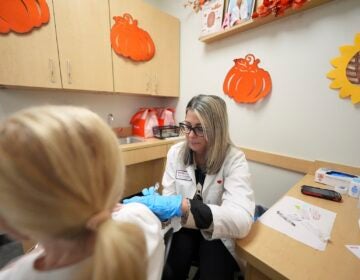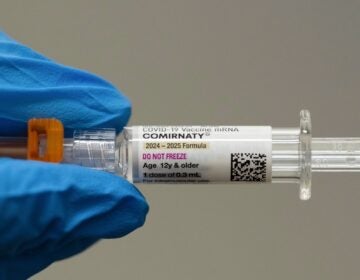Philadelphia physician Dr. Ala Stanford publishes memoir on overcoming adversity and the health care system
The pediatric surgeon founded the Black Doctors Consortium and worked as a regional health director under the Biden administration.
Listen 1:51
Dr. Ala Stanford, founder of the Black Doctors Consortium, in front of the site of their new health equity center opening in October 2021. (Kimberly Paynter/WHYY)
From Philly and the Pa. suburbs to South Jersey and Delaware, what would you like WHYY News to cover? Let us know!
Philadelphia native and pediatric surgeon Dr. Ala Stanford became a leader in the city’s response to the COVID-19 pandemic. She founded the Black Doctors Consortium and was later appointed by President Joe Biden to help oversee the Mid-Atlantic region of the U.S. Department of Health and Human Services.
Stanford is also a professor at the University of Pennsylvania, a health policy advisor and founder of R.E.A.L. Concierge Medicine, a health care consultancy and advocacy company.
Now, the physician is an author with the release of her new book, “Take Care of Them Like My Own: Faith, Fortitude and a Surgeon’s Fight for Health Justice.”
It’s partly a memoir and partly a conversation on health equality and justice, especially the racial injustices within our health care systems, and the challenges young Black people face in pursuing medical careers.
WHYY News’ Nicole Leonard spoke to the physician about her latest project.
Q: Throughout what is already a very accomplished career, how do you stay connected to Philadelphia and the communities you grew up in?
STANFORD: The medical office that I have at 21st Street and Lehigh Avenue. It is in the heart of North Philly, I was born in North Philly. It’s adjacent to a church and it’s across from Dobbins High School and it’s near federal housing, and I’m in the community. So, coming to work every day, seeing folks get the bus, walking by kids going to school, that’s what keeps me grounded. It reminds me why I do so much of what I do.
You were born in North Philly and grew up in Germantown and Mount Airy with a single mother. How much did your childhood and your experiences in Philadelphia shape your career in medicine and how you approach health care?
We were not affluent, let’s put it that way. So once upon a time, we used public assistance. We needed that assistance to eat and to have a roof over our heads. We did not have a car. We took SEPTA everywhere. We washed our clothes in a laundromat.
And growing up in Philly, I think a lot of the young people have to grow up faster than other kids, like my kids growing up in the suburbs, and that sort of grit that is known with being Philadelphia is what has prepared me for every potential obstacle that I have encountered. All of those things that when you’re growing up seem so hard are the same things that allow you to be more empathetic with others. So, I get it when someone can’t make an appointment, because if they take off work early, they won’t get paid. If they don’t get paid, they can’t buy food for their families.
When did you first think about writing a book? Did you always know what you wanted to include in the story?
Years ago, I had written about being a patient and surgeon, my experience being a patient. As surgeons, we try to be empathetic and compassionate and explain things, but when you’re a patient, it’s totally, totally different. And so, I had started just writing about that a lot. And I’m someone who journals, so I used to write a lot of those things down.
I had probably written about four chapters, and I sent it to [a publisher] and she was like, “This is amazing.” And we talked about what the book would be about.
I started talking about growing up in Philly, doing mission work in Haiti, about how when Will Smith decided he was going to bungee jump out of a helicopter over the Grand Canyon for his 50th birthday how I was responsible for building this [medical] triage in the middle of a desert. I had to go out, survey the area, I had to see what the terrain was like, how close we were to water, how close we were to hospitals, what things we would have to bring.
So, you have these two different environments — one where everything I needed as long as I could justify it, I had, and another where all the equipment we had, we brought from America to this developed nation [Haiti], and still we were able to take care of everyone. Those experiences, at the time I didn’t realize, were preparing me for COVID.
It was things like that that I said, “This would kind of shape up to be a nice kind of story.”
And then all the adversity in becoming a doctor, and then becoming a surgeon, and then becoming a pediatric surgeon, which there is even a smaller number of, and even a smaller, smaller number of women pediatric surgeons, and another smaller, smaller number of Black women pediatric surgeons. I needed to tell that story.
So often, when people experience stuff, they never talk about it. When people talk about microaggression and unconscious or conscious bias, it’s all these words, but it’s not a real story or narrative to go with it, so I said, “Ok, I’m going to tell you what happened to me.”
Some of the things that happened in my life, it’s just unbelievable. And people get away with it every day. That’s why the attrition rates tend to be so high, especially for Black folks in medicine. It’s why the percentage of Black physicians in the United States is still at 5% or lower because of some of these things. Becoming a doctor and a surgeon is challenging enough, so then to add that on top of it is just, it’s a lot. And I wanted to talk about that and say, “But you can get through it. Don’t give up.”
Your book, ‘Take Care of Them Like My Own: Faith, Fortitude and a Surgeon’s Fight for Health Justice,’ how important was choosing this title and the meaning behind it?
I wanted the title itself, even if you never read the book, to send a message. So, “Take Care of Them Like My Own,” to me, is how we get to equitable care for everyone. How you’re taking care of your client, how you’re taking care of your colleague, how you’re taking care of someone who works for you or with you, is it the way you would want your daughter to be treated or your husband or your wife, someone you care about, someone in your family?
I think of some of the stories of how I know young women have been treated in emergency departments, and like, “Would you have done that if it were your daughter?” I know that they wouldn’t have done it.
And then the faith [part], everything in my life, I believe, my steps have been ordered by God. My life has been spared more than once. Times where something untoward should have happened to me, didn’t, and every time I needed something to happen a certain way, there’s been a solution. I don’t believe things happen by accident or coincidence. For me, it’s faith.
And then the fortitude, that’s the Philly. The fortitude is the Philly. That’s the stick-to-it-ness, the no nonsense, that’s Philly all day.
“Take Care of Them Like My Own: Faith, Fortitude and a Surgeon’s Fight for Health Justice” is on store shelves at major retailers, local book stores and online starting Aug. 6. A book launch event with Dr. Ala Stanford will be held Tuesday, Aug. 6 at the Kimmel Center in Philadelphia. Tickets are available at ensembleartsphilly.org.
WHYY is your source for fact-based, in-depth journalism and information. As a nonprofit organization, we rely on financial support from readers like you. Please give today.





